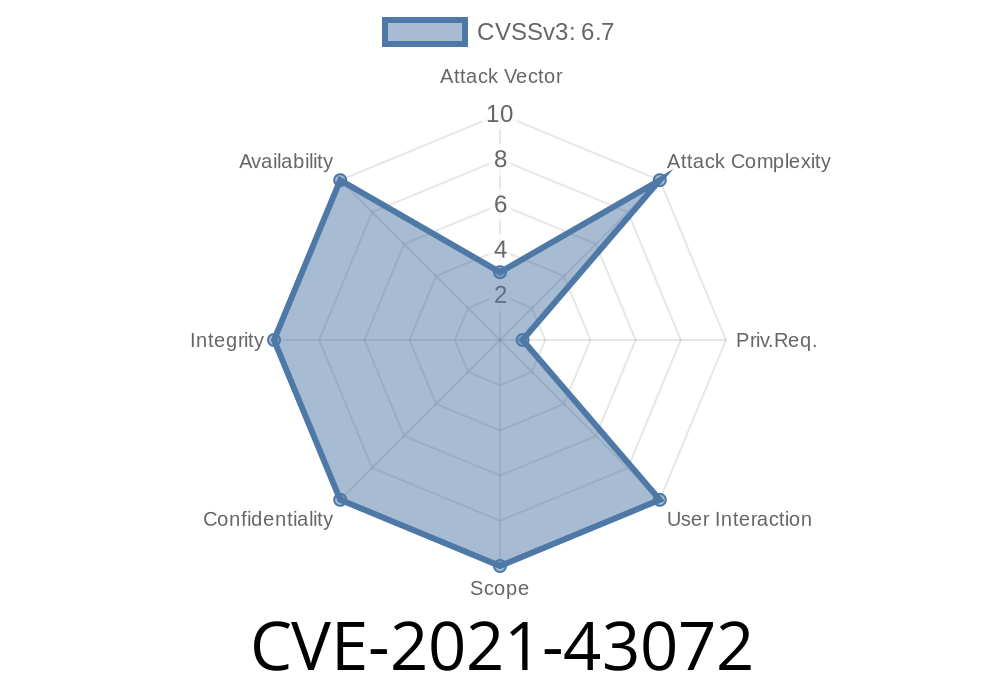In late 2021, security researchers and Fortinet discovered a serious vulnerability—CVE-2021-43072—that impacts several Fortinet products including FortiAnalyzer, FortiManager, FortiOS, and FortiProxy. This flaw is a classic buffer overflow, meaning it results from copying user input into a buffer without proper size checks. This simple coding mistake enables attackers to execute arbitrary code with high privileges.
This article breaks down this vulnerability, shows example code, explains how attackers exploit it, and links to the original references. If you manage a Fortinet device, this is a *must-read*.
What is CVE-2021-43072?
CVE-2021-43072 is caused by unsafe buffer handling in the Fortinet CLI commands:
execute certificate remote
When using the *tFTP protocol*, both commands copy filenames and paths from user input into fixed-sized buffers without verifying the real input size. This means a long enough input can overflow the buffer, corrupting nearby memory—potentially letting an attacker take over the device.
Impacted Fortinet Products and Versions:
- FortiAnalyzer: 7..2 and below, 6.4.7 and below, 6.2.9 and below, 6..11 and below, 5.6.11 and below
- FortiManager: 7..2 and below, 6.4.7 and below, 6.2.9 and below, 6..11 and below, 5.6.11 and below
FortiProxy: 7..–7..3, 2..–2..8, 1.2.x, 1.1.x, 1..x
Attack Entry Point:
Attackers must have access to the CLI (locally or remotely) and typically need at least *low privileges*. Exploit involves using tFTP to send overlong parameters to the above commands.
A classic buffer overflow comes from code like this
// Vulnerable pseudo-code (for demonstration)
char filename[256];
strcpy(filename, user_input); // Dangerous: no check on user_input size!
If user_input is longer than 255 characters, it spills into extra memory. Safe code would use strncpy and check the total size.
Better code
char filename[256];
strncpy(filename, user_input, sizeof(filename) - 1);
filename[255] = '\'; // Always null terminate!
In the actual Fortinet code behind these CLI commands, unsafe copying lets crafty attackers overwrite memory.
An attacker connects (CLI/SSH or local console), then crafts a filename like
execute restore image tftp very_long_filename..................................................
or
execute certificate remote tftp very_long_filename..................................................
If the filename is far longer than 256 bytes, it *overflows the buffer*. Carefully chosen data may let attackers control the instruction pointer (EIP/RIP) or variables, letting them run their own code.
1. Generate an overlong filename payload
payload = "A" * 300 # Fills buffer and overwrites adjacent memory
print(f"execute restore image tftp {payload}")
2. Paste in CLI or via SSH (if you have permissions)
execute restore image tftp AAAAAAAAAAAAAAAAAAA...[repeat to 300+]
In a real-world attack, instead of just "A", the payload could be shellcode plus a new instruction pointer.
Upgrade to fixed releases listed in the vendor’s advisory.
- Restrict CLI/SSH access—only trusted admins should have access.
Official References & Resources
- Fortinet PSIRT Advisory
- NVD CVE-2021-43072 Entry
- Full list of patched versions
Summary
CVE-2021-43072 highlights why *simple programming mistakes* like unchecked buffer copies can be devastating, especially on security appliances. If you run a FortiGate, FortiAnalyzer, FortiManager, or FortiProxy device, check your version immediately, upgrade if needed, and lock down CLI access.
If attackers can reach the CLI and exploit this buffer overflow, they can take full control. Patch, restrict, monitor—today!
*This article is for educational purposes and should not be used for unauthorized activities.*
Timeline
Published on: 07/18/2023 03:15:54 UTC
Last modified on: 11/07/2023 03:39:17 UTC
